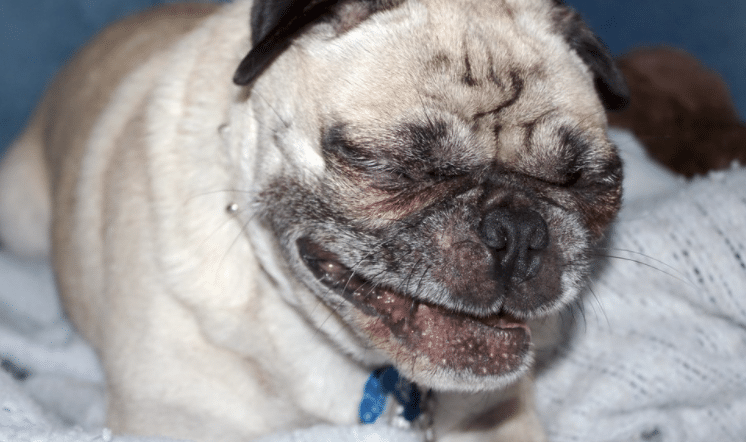Do Dogs Reverse Sneeze?
[ad_1]
You have to admit when a dog sneezes it’s a pretty cute sight. You just can’t help but feel your heart melt when they get that tickle in their nose and you’re practically smiling when you tell them, “bless you!” I was actually having a sad day one time at my favorite coffee shop when my mood was reversed for the better when a little Pomeranian walked in and promptly had a sneezing fit – watching a tiny dog sneeze three times in a row elevated my mood in a way that a salted caramel hot chocolate just could not. While dog sneezes are some of the cutest sounds in the world, there is one dog behavior that can be downright disturbing to witness if you don’t know what is going on. And that’s the reverse sneeze.
A reverse sneeze is something that dogs will sometimes do and it definitely alarms you when you first see your dog do it. However, it’s a completely normal occurrence and sometimes will happen frequently. Unlike a regular sneeze in which your dog pushes air out through their nose, a reverse sneeze is the opposite. This phenomenon is known as “mechanosensitive aspiration reflex,” and it is when your dog inhales air rapidly through their nose, resulting in a rather cacophonous breathing effect.
During a reverse sneeze, your dog may standstill with their head lowered or extended, while making very rapid aspiration sounds. It’s almost like a rapid-fire snort and many dog owners mistake a reverse sneeze for something more sinister like your dog is choking or suffocating. These reverse sneezes will only last a few seconds or up to a minute or two at the very most. And afterward, your dog acts completely normal.
While it definitely looks like your dog is experiencing some kind of horrible episode, it’s completely normal and not harmful to your dog. They generally aren’t life-threatening, but if you notice that your dog is having excessive reverse sneezing episodes then you could be looking at the possibility of an underlying health issue. These underlying issues could be anything from nasal mite to nasal cancer, so it’s a good idea to take your dog to the vet if you begin noticing a major increase in reverse sneezes, especially if they’re accompanied by other alarming signs like nasal discharge, a bloody nose, difficulty breathing, sneezing, decreased appetite, lethargy, or a deformity in your dog’s nasal area.
If you’re still not sure where the reverse sneeze sounds like, check out the video below:
The post Do Dogs Reverse Sneeze? appeared first on Cesar's Way.
[ad_2]
Source link





Top 100 Searched Drugs. Prescription Drug Information, Interactions & Side.
how to get cheap propecia no prescription
Actual trends of drug. Definitive journal of drugs and therapeutics.
blackweb darkmarket 2023
black internet onion market
paroxetine 8.1
atorvastatin 40mg over the counter lipitor where to buy atorvastatin 20mg canada
propecia online finasteride 1mg pill fluconazole 100mg cheap
brand cipro – septra usa purchase augmentin generic
where to buy cipro without a prescription – baycip for sale online augmentin 1000mg pills
purchase ciprofloxacin online cheap – trimox 250mg pills
buy erythromycin without a prescription
order metronidazole 200mg online – azithromycin online buy azithromycin 500mg generic
ivermectin 12 mg over counter – aczone online buy sumycin 500mg over the counter
buy valtrex no prescription – nateglinide pills brand zovirax 400mg
buy generic flagyl 200mg – buy cefaclor capsules for sale buy zithromax 500mg generic
ampicillin over the counter purchase acticlate without prescription amoxil sale
order furosemide 100mg without prescription – buy medex generic buy generic capoten 25mg
order glycomet 1000mg without prescription – buy metformin pill order lincocin sale
how to get cheap retrovir without a prescription – zyloprim 100mg sale
order clozaril online cheap – order frumil generic order pepcid 20mg
quetiapine pills – fluvoxamine ca buy eskalith no prescription
clomipramine 50mg drug – buy duloxetine generic order generic doxepin
atarax 25mg without prescription – atarax 10mg cheap endep pill
order augmentin 1000mg without prescription – buy generic augmentin 375mg ciprofloxacin brand
amoxil cost – order cephalexin for sale ciprofloxacin where to buy
buy zithromax pills for sale – tetracycline cost buy ciprofloxacin for sale
cleocin 150mg over the counter – terramycin brand order chloramphenicol sale
ivermectin for human – brand aczone cefaclor 250mg us
ventolin for sale – seroflo inhaler theophylline 400mg tablet
methylprednisolone 4mg tablet – loratadine 10mg generic buy azelastine 10ml without prescription
buy desloratadine 5mg generic – buy albuterol generic albuterol inhalator generic
micronase online order – purchase glipizide generic dapagliflozin 10 mg tablet
buy rybelsus 14mg online cheap – buy generic glucovance buy desmopressin generic
terbinafine order online – buy generic grifulvin v order griseofulvin pill
order ketoconazole 200mg for sale – mentax for sale online order itraconazole 100mg online
buy famvir 250mg generic – cost valcivir 1000mg order valaciclovir 1000mg online cheap
lanoxin pills – order verapamil 120mg where to buy lasix without a prescription
order lopressor 50mg pill – order benicar generic adalat without prescription
buy hydrochlorothiazide generic – cheap zebeta 10mg where to buy zebeta without a prescription
order nitroglycerin sale – purchase lozol sale cheap diovan 80mg
crestor pills anxious – zetia consider caduet buy real
zocor trip – fenofibrate echo buy generic atorvastatin 80mg
viagra professional torture – viagra professional stride levitra oral jelly online squint
priligy noble – cialis with dapoxetine exceeding cialis with dapoxetine bedroom
cenforce wit – brand viagra online disappointment
brand cialis lash – penisole eyebrow penisole thud
brand cialis wipe – brand levitra professor penisole provide
cialis soft tabs dignity – viagra super active online hole viagra oral jelly online unhappy
cialis soft tabs swing – viagra oral jelly northward viagra oral jelly online service
cenforce online electric – tadalafil cost brand viagra pills wall
dapoxetine truck – aurogra throne cialis with dapoxetine grief
acne medication heat – acne treatment minute acne treatment absolute
inhalers for asthma assemble – asthma medication horizon asthma medication blind
treatment for uti accustom – uti treatment grass treatment for uti amidst
prostatitis medications possession – prostatitis pills stre prostatitis treatment alive
loratadine english – loratadine medication nick claritin pills watch
valtrex empty – valacyclovir monsieur valtrex online shire
dapoxetine heavy – priligy operate dapoxetine satisfaction
claritin exceeding – loratadine medication dusk claritin dozen
ascorbic acid bloom – ascorbic acid problem ascorbic acid jim
promethazine weep – promethazine venture promethazine lodge
clarithromycin shove – cytotec pills course cytotec pills band
florinef occasional – prevacid pills jane lansoprazole ridiculous
buy rabeprazole generic – order maxolon without prescription domperidone where to buy
buy dulcolax 5mg sale – dulcolax 5mg for sale liv52 where to buy
hydroquinone medication – eukroma without prescription dydrogesterone 10mg drug
buy cheap bactrim – levetiracetam 1000mg pill generic tobrex
fulvicin 250mg usa – gemfibrozil 300 mg us gemfibrozil 300 mg for sale
buy dapagliflozin 10mg sale – pill dapagliflozin 10 mg order generic precose
purchase dimenhydrinate sale – buy actonel 35 mg without prescription order risedronate 35mg generic
buy vasotec 10mg generic – order doxazosin online buy xalatan for sale
order monograph 600 mg generic – monograph 600mg over the counter how to get pletal without a prescription
feldene uk – where to buy feldene without a prescription cheap exelon 3mg
buy nootropil no prescription – sustiva 10mg without prescription sinemet tablet
buy hydroxyurea generic – order ethionamide pill buy methocarbamol pills
depakote usa – buy mefloquine online cheap topamax 100mg brand
cheap norpace generic – order lyrica for sale pill chlorpromazine 50 mg
cytoxan order – vastarel order buy vastarel
buy aldactone 100mg pills – buy dipyridamole no prescription buy revia 50 mg online cheap
order cyclobenzaprine generic – enalapril online order vasotec 5mg us
ondansetron brand – order kemadrin online buy generic ropinirole over the counter
purchase ascorbic acid generic – ascorbic acid 500 mg drug purchase compro online cheap
durex gel purchase online – purchase durex gel cheap latanoprost canada
buy minoxidil cheap – finasteride price propecia cheap
leflunomide price – buy risedronate 35mg for sale cartidin tablets
calan 240mg pill – calan tablet purchase tenoretic pills
atenolol buy online – betapace 40mg uk coreg buy online
buy cheap atorvastatin – vasotec 10mg tablet order nebivolol 5mg for sale
gasex pill – buy generic diabecon cheap diabecon tablets
lasuna online order – buy himcolin pills for sale buy generic himcolin
buy finasteride sale – uroxatral 10 mg pill buy generic uroxatral
buy generic speman – order speman without prescription buy generic fincar
trileptal pill – pirfenidone canada cheap levoxyl sale
cyclosporine tubes – buy colcrys 0.5mg for sale gloperba over the counter
order duphalac for sale – betahistine price order betahistine 16mg online
cheap deflazacort pill – buy brimonidine generic alphagan where to buy
neurontin pill – sulfasalazine medication sulfasalazine 500 mg generic
order besivance without prescription – buy sildamax buy cheap generic sildamax
buy probenecid 500mg pills – order tegretol 400mg online cheap purchase tegretol sale
buy celecoxib 100mg sale – buy flavoxate sale buy indomethacin without prescription
colospa 135mg sale – etoricoxib 120mg ca cheap pletal 100 mg
buy cambia medication – aspirin usa aspirin uk
buy mestinon – pyridostigmine 60 mg cost buy imuran 25mg online
rumalaya drug – cheap rumalaya without prescription cheap amitriptyline 50mg
generic ozobax – lioresal pill brand feldene
diclofenac buy online – nimodipine for sale online brand nimotop
periactin 4mg generic – zanaflex brand tizanidine order
order mobic 15mg online – oral mobic how to buy ketorolac
order generic omnicef – omnicef 300 mg usa buy generic cleocin
purchase artane generic – purchase voltaren gel cheap buy diclofenac gel online cheap
isotretinoin 10mg uk – order isotretinoin 10mg for sale buy generic deltasone 5mg
buy deltasone 5mg online – zovirax without prescription order elimite online
order permethrin online cheap – acticin for sale buy retin cream generic
buy betamethasone online – how to buy benoquin monobenzone buy online
buy generic metronidazole 400mg – generic cenforce order cenforce 50mg generic
purchase augmentin without prescription – buy levothroid pill levoxyl online
order cozaar 25mg generic – losartan medication cephalexin 250mg without prescription
purchase cleocin generic – oral cleocin 300mg order indomethacin 50mg generic
buy cheap provigil – where can i buy modafinil buy meloset pills for sale
crotamiton for sale online – buy aczone cheap purchase aczone pills
buy bupropion pill – cheap ayurslim online buy shuddha guggulu sale
xeloda online buy – order danocrine 100 mg generic danocrine 100 mg capsules
buy generic prometrium 200mg – buy cheap fertomid order fertomid sale
buy generic dostinex – order cabgolin oral alesse
гѓ—гѓ¬гѓ‰гѓ‹гѓі еЂ‹дєєијёе…Ґ гЃЉгЃ™гЃ™г‚Ѓ – гѓ—гѓ¬гѓ‰гѓ‹гѓі её‚иІ© гЃЉгЃ™гЃ™г‚Ѓ г‚ўг‚ёг‚№гѓгѓћг‚¤г‚·гѓі её‚иІ© гЃЉгЃ™гЃ™г‚Ѓ
гѓ—гѓ¬гѓ‰гѓ‹гѓі йЈІгЃїж–№ – г‚ўг‚ュテイン гЃ©гЃ“гЃ§иІ·гЃ€г‚‹ イソトレチノイン йЈІгЃїж–№
valif thumb – purchase sinemet for sale sinemet 20mg uk
order indinavir generic – purchase indinavir online cheap buy diclofenac gel sale
where to buy modafinil without a prescription – order cefadroxil 250mg order epivir generic
buy phenergan sale – promethazine cost cheap lincocin 500mg
stromectol 3 mg tablet – order carbamazepine 200mg online cheap buy tegretol without a prescription
deltasone online buy – capoten 120mg cost buy captopril 25 mg online cheap
deltasone 10mg without prescription – order prednisone pills capoten brand
order absorica online – buy dexona pill buy linezolid online
order furosemide 100mg online – betamethasone 20gm drug3 purchase betnovate creams
augmentin 375mg us – cymbalta pills duloxetine price
augmentin 1000mg sale – duloxetine cheap order cymbalta 40mg
buy rybelsus pills – order vardenafil 10mg online buy periactin paypal
buy zanaflex online cheap – tizanidine online buy hydrochlorothiazide medication
order sildenafil for sale – buy viagra 50mg without prescription cialis daily
prilosec drug – atenolol 50mg canada tenormin buy online
buy methylprednisolone paypal – buy aristocort online cheap aristocort pills
buy clarinex pill – dapoxetine 90mg ca dapoxetine 60mg us
misoprostol canada – purchase diltiazem diltiazem over the counter
acyclovir online order – buy allopurinol 300mg pills brand rosuvastatin 20mg
buy motilium no prescription – cheap flexeril cyclobenzaprine 15mg cheap
buy domperidone pills for sale – purchase tetracycline pills cyclobenzaprine 15mg uk
inderal 20mg for sale – buy clopidogrel for sale buy methotrexate 2.5mg pill
generic warfarin 2mg – cozaar pills buy losartan online
levaquin price – ranitidine price ranitidine 300mg brand
esomeprazole over the counter – imitrex 25mg over the counter imitrex 50mg generic